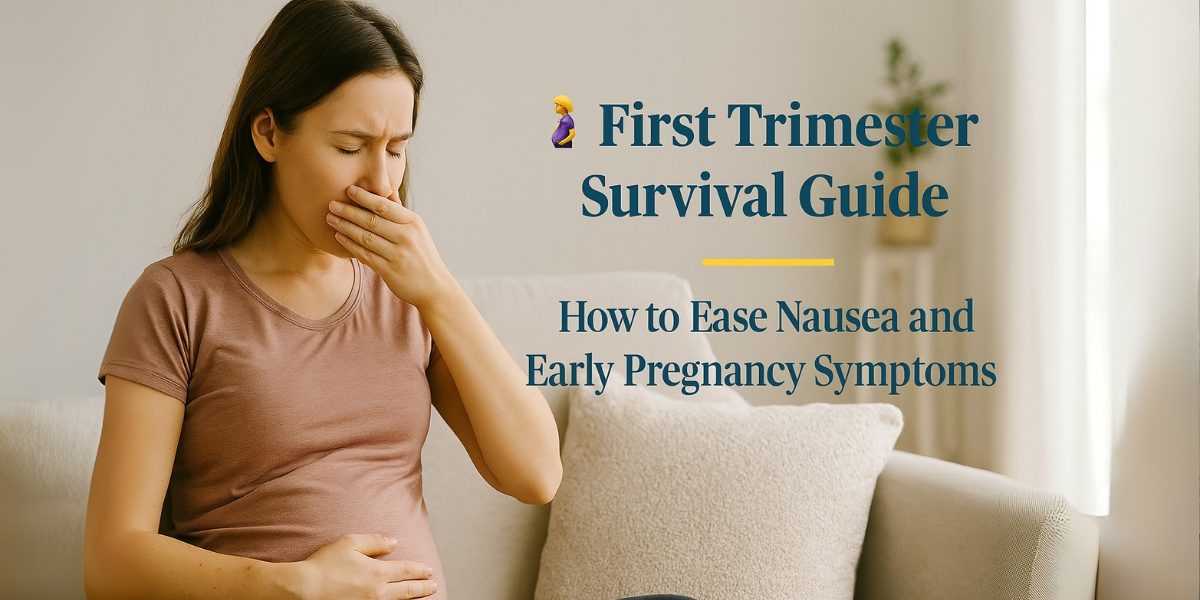Simple, gentle tips for new moms on how to ease nausea and feel more like yourself during those challenging first weeks.
The first trimester is a magical beginning… wrapped in a lot of not-so-magical symptoms.
For many women, early pregnancy means nausea, fatigue, food aversions, sore breasts, and emotional ups and downs — all while often keeping the pregnancy a secret.
If you’re in the thick of it, mama — you’re not alone.
These tips may help you feel better and navigate the first 12 weeks with more ease.
🤢 1. Fighting Nausea (Morning, Afternoon, and Night)
Nausea can strike at any hour — and while it’s often called “morning sickness,” many moms feel it all day long. Here’s what may help:
✅ Small, Frequent Meals
Instead of 3 large meals, eat every 2–3 hours to avoid an empty stomach (which often triggers nausea).
✅ Keep Crackers Nearby
Keep a pack of crackers or dry cereal on your nightstand. Eat before getting out of bed to settle your stomach.
✅ Ginger Everything
Ginger is a natural anti-nausea remedy:
- Ginger tea or chews
- Ginger ale (real ginger)
- Ginger drops or capsules (ask your doctor first)
✅ Vitamin B6
Studies show Vitamin B6 (pyridoxine) can reduce nausea. Your provider may recommend a supplement or prescribe Diclegis (B6 + Unisom).
✅ Mint or Lemon
Smelling lemon, mint, or sipping lemon water can ease queasiness. Essential oils (used safely) can also help.
🚫 Avoid Strong Smells
Cooking odors, perfumes, or coffee may worsen nausea. Open windows, use a fan, or delegate cooking when you can.
🥱 2. Dealing with Exhaustion
First trimester fatigue isn’t regular tired — it’s deep cellular fatigue. Your body is creating a placenta and adjusting to new hormone levels.
What helps:
- Nap when you can — even 20 minutes helps
- Say no to non-essential plans
- Go to bed early — seriously, 8:00 PM is fine
- Prioritize protein and iron-rich foods for steady energy
💡 Be gentle with yourself. You’re doing an incredible job — even if you feel like all you do is nap and snack.
🍕 3. What to Eat When Nothing Sounds Good
Food aversions can make eating difficult — but staying nourished helps both you and baby.
Try:
- Toast with almond butter
- Smoothies with fruit, spinach, yogurt
- Oatmeal with cinnamon and banana
- Bone broth or veggie soups
- Cold foods (salads, yogurt) if hot smells bother you
Don’t worry about perfection — just eat what you can tolerate and hydrate often.
💧 4. Stay Hydrated (Even If You Don’t Feel Like It)
Dehydration can make nausea worse. Sip small amounts of:
- Water with lemon
- Coconut water
- Herbal teas (like peppermint or ginger)
- Ice chips if nothing else works
Tip: Try using a straw or cold water in a bottle — sometimes it’s easier to sip without thinking.
💬 5. When to Call Your Provider
While nausea and fatigue are common, contact your doctor if you:
- Can’t keep any food or water down for 24+ hours
- Feel dizzy, faint, or lose weight quickly
- Vomit more than 4–5 times per day
You may have hyperemesis gravidarum, a condition that requires medical support — and you’re absolutely not failing if you need help.
💛 Final Thoughts
The first trimester can feel like a quiet battle — you’re doing so much on the inside, even when it doesn’t show.
Take it one hour at a time. Celebrate the small wins.
And remember: you won’t feel this way forever.
Soon, your energy will return, the nausea will fade, and you’ll feel more like yourself again — just with a growing miracle inside.




